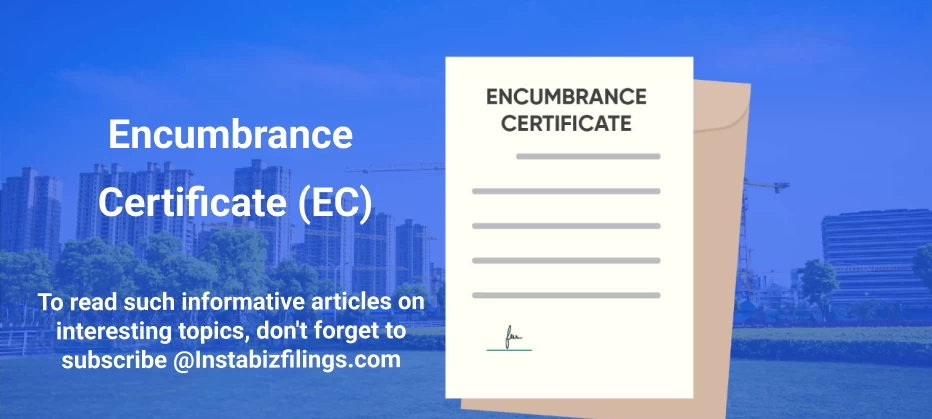
Encumbrance Certificate (EC)
August 25, 2025 by Team Instabizfilings
What is an Encumbrance Certificate (EC)?
An Encumbrance Certificate (EC) is a document of a legal nature that attests the fact that a specific property has no liabilities, either monetary or legal, e.g. in the form of loan or mortgage, or a certain legal struggle. It is an important document in the transactions of properties whereby it makes sure that the title to the property is marketable and unambiguous.
Why is an Encumbrance Certificate Important?
-
Property Buyers: To verify that the property they are about to purchase does not have any legal dues.
-
Home Loan Applicants: Financial institutions and banks demand ECs by the time they first sanction a home loan.
-
Property Registration: In some states, the governments require submission of an EC before property purchases.
-
Verification of Ownership History: It documents ownership and past transaction histories and will help in the verification of title.
Key Details in an Encumbrance Certificate
-
The information about the property (survey number, site, description)
-
Name(s) of the land owner(s)
-
Specifications of transactions (sale, lease, gift, mortgage, and so on).
-
Term of encumbrance (most often 12-30 years)
-
Type of certificate (form 15 or form 16)
-
Mark and imprint of the issuing body
Types of Encumbrance Certificates
-
Form 15: This one is issued when there is an encumbrance of any kind (e.g., mortgage, lien) on the property.
-
Form 16: When there are no encumbrances during the said period, then it is issued.
How to Apply for an Encumbrance Certificate?
An EC can be obtained online as well as offline, depending on location, through the Sub-Registrar Office (SRO) under which the property is registered. These steps are normally:
Offline Application
-
Visit the Sub-Registrar Office.
-
Fill out the Form 22 application.
-
Post address proof, a copy of the title deed and details of the property.
-
Pay the applicable fee (varies by state and duration).
-
The EC is normally released within a period of 7-15 working days.
Online Application (available in many Indian states):
-
Go to the state registration official portal.
-
Click on the Apply EC option.
-
Fill out the required data and provide documents.
-
Make an online payment.
-
Once it is approved, download the EC.
Documents Required for EC Application
-
Property document or a sale deed
-
Survey number address details of property Details
-
Address proof and ID proof
-
Past EC copy (when it exists)
-
Fees and application form
Time Taken and Validity
-
Time Taken: It takes approximately 7-15 working days.
-
Validity: The EC can provide information of a particular period accordingly. It is not a lifetime rule.
Limitations of an Encumbrance Certificate
While EC is crucial, it may not reflect:
-
Unregistered agreements (e.g., oral agreements or non-registered leases)
-
Court litigation unless notified to the registrar
-
Outstanding property tax or government dues
Hence, buyers should also conduct a legal due diligence in addition to obtaining an EC.
Conclusion
An encumbrance certificate (EC) constitutes one of the main documents of the process that occurs during the ownership and sale of property in India. When purchasing a property, taking out a home loan, transferring or checking ownership, the EC guarantees that the property does not have encumbrances. Never make a transaction without conducting a thorough check by cross-checking with a property lawyer.
Disclaimer
The information provided in this blog is purely for general informational purposes only. While every effort has been made to ensure the accuracy, reliability and completeness of the content presented, we make no representations or warranties of any kind, express or implied, for the same.
We expressly disclaim any and all liability for any loss, damage or injury arising from or in connection with the use of or reliance on this information. This includes, but is not limited to, any direct, indirect, incidental, consequential or punitive damage.
Further, we reserve the right to make changes to the content at any time without prior notice. For specific advice tailored to your situation, we request you to get in touch with us.

Need more details? We can help! Talk to our experts now!
Start Your Business Registration – Talk to Our Experts Now!

Still Confused?
Talk to experts? Fill in the information and we will reach out in 24 Working Hours.

